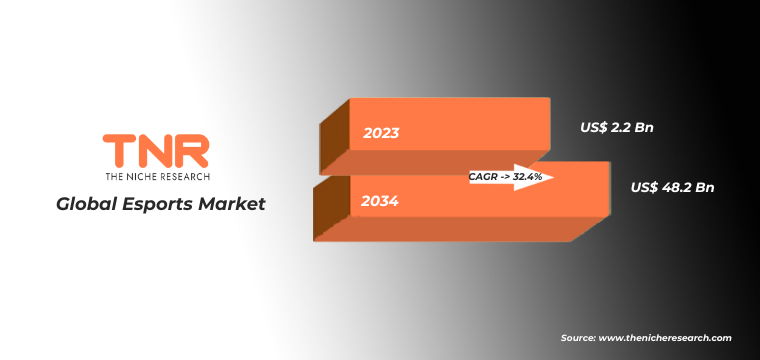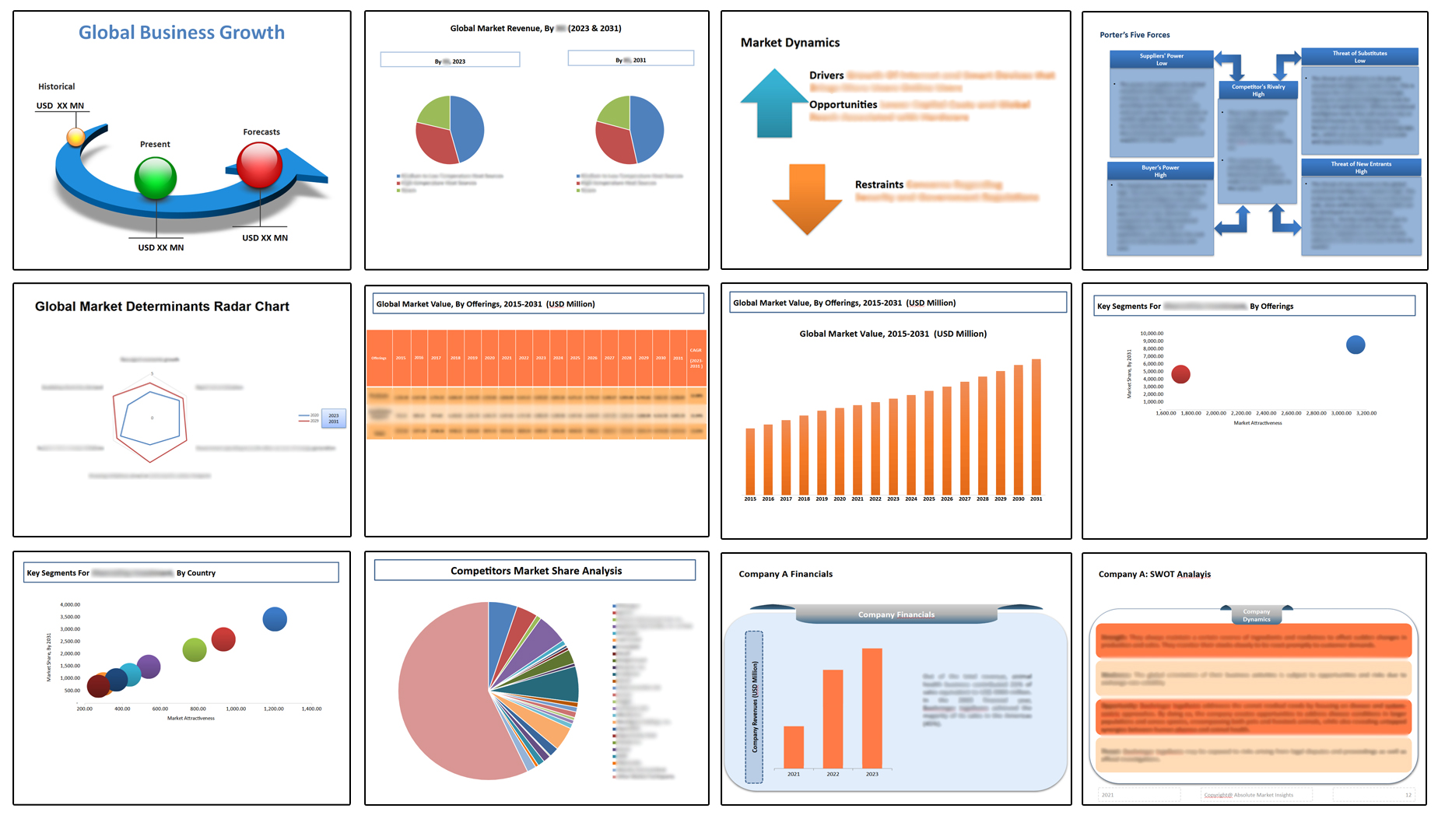Global Esports Market: By Genre, By Business Model, By Platform Type, By Streaming Type, By Region & Segmental Insights Trends and Forecast, 2024 – 2034
- Industry: Technology
- Report ID: TNR-110-1134
- Number of Pages: 420
- Table/Charts : Yes
- June, 2024
- Base Year : 2024
- No. of Companies : 10+
- No. of Countries : 29
- Views : 10139
- Covid Impact Covered: Yes
- War Impact Covered: Yes
- Formats : PDF, Excel, PPT
Esports, short for electronic sports, refers to organized competitive gaming where individuals or teams compete against each other in video game tournaments. These events can range from local amateur contests to large-scale international championships, often held in arenas and broadcasted live to millions of viewers online. Esports encompasses a variety of game genres, including first-person shooters (FPS), multiplayer online battle arenas (MOBA), and real-time strategy (RTS) games, with popular titles like League of Legends, Dota 2, and Counter-Strike: Global Offensive.
The rapid growth of the esports industry is fueled by advancements in technology, widespread internet accessibility, and the increasing legitimacy of gaming as a professional career. With substantial prize pools, sponsorships, and a passionate global fanbase, esports has evolved into a multi-billion dollar industry that rivals traditional sports in terms of viewership and commercial interest. The dynamic nature of esports continues to attract new players, audiences, and investors, solidifying its place in contemporary entertainment culture.
The explosive growth of esports is driven by several key demand drivers that collectively fuel its expansion. One primary factor is the widespread accessibility and popularity of online streaming platforms like Twitch and YouTube Gaming, which allow millions of fans to watch live esports events and interact with their favourite players in real-time. Additionally, advancements in technology, including high-speed internet and sophisticated gaming hardware, enhance the player and viewer experience, making esports more engaging and immersive.
The demographic shift towards a younger, tech-savvy audience also plays a crucial role, as millennials and Gen Z consumers are more inclined to embrace digital entertainment forms. Furthermore, substantial investments from traditional sports franchises, celebrities, and major corporations have legitimized esports, bringing in significant financial backing and media exposure. These elements, combined with the global reach and cultural integration of gaming, ensure a steady rise in demand, solidifying esports as a dominant force in the entertainment industry.
In terms of revenue, the global esports market was worth US$ 2.2 Bn in 2023, anticipated to witness CAGR of 32.4% during 2024 – 2034.

Global Esports Market Dynamics
Expanding Audience: The global audience for esports is rapidly growing, with millions of viewers tuning in to watch live tournaments and streams. This expansion is driven by increased internet access, popularity among younger demographics, and the proliferation of streaming platforms. Diverse revenue streams, including advertising, merchandise, and in-game purchases, support the financial health of the esports ecosystem. Effective monetization strategies ensure sustainable growth and profitability for stakeholders.

Technological Advancements: Cutting-edge technology, such as high-speed internet, VR, and AR, enhances the gaming and viewing experience. These advancements attract a larger audience and create new opportunities for immersive and interactive gameplay and spectating. Significant investments from major brands and venture capitalists fuel the industry’s growth. Sponsorship deals provide crucial funding for tournaments and teams, while investments drive innovation and infrastructure development.
Professionalization and Leagues: The establishment of professional leagues and structured tournaments brings legitimacy and organization to esports. This professionalization attracts top-tier talent, fosters competitive integrity, and enhances viewer engagement. Media rights agreements with traditional sports networks and digital platforms expand esports’ reach. Broadcasting deals increase visibility and generate substantial revenue, highlighting esports as a mainstream entertainment option.

Fighting Games Segment Has Garnered Major Market Share in the Global Esports Market During the Forecast Period (2024 – 2034).
Fighting games have carved out a unique and dynamic niche within the esports landscape, with several key factors driving their demand. The genre’s inherent appeal lies in its fast-paced, head-to-head combat, which translates into thrilling and easily understandable viewing experiences for audiences. This accessibility attracts a broad spectrum of viewers, from casual gamers to dedicated esports enthusiasts. Major franchises like Street Fighter, Tekken, and Super Smash Bros. have cultivated dedicated fanbases over decades, contributing to robust community engagement and loyalty.
Additionally, the rise of online tournaments and streaming platforms has amplified the visibility of fighting game competitions, making it easier for new players and spectators to participate and follow their favourite events. Sponsorship and media coverage have further fueled growth, bringing in new revenue streams and professional opportunities for players. The grassroots nature of many fighting game communities, combined with high-profile events like EVO, ensures continuous excitement and innovation, driving sustained demand within the esports ecosystem.

By Business Model Sponsorships and Advertising Segment had the Highest Share in the Global Esports Market in 2023.
Sponsorships and advertising have emerged as pivotal demand drivers in the esports industry, significantly boosting its growth and visibility. Major brands across various sectors, from tech giants to beverage companies, are increasingly investing in esports sponsorships, recognizing the potential to reach a highly engaged and youthful audience. These sponsorships provide essential financial support to esports teams, tournaments, and events, enhancing production quality and prize pools, which in turn attract more viewers and participants.
Additionally, advertising through streaming platforms like Twitch and YouTube Gaming allows brands to leverage targeted marketing, engaging viewers with tailored ads and interactive content. This symbiotic relationship between sponsors and the esports ecosystem not only elevates the overall experience for fans but also drives substantial revenue streams, making the industry more lucrative and sustainable. Consequently, the influx of sponsorship and advertising dollars continues to propel esports forward, cementing its position as a mainstream entertainment phenomenon.

By Region, North America dominated the Global Esports Market in 2023.
The esports industry in North America has witnessed a significant surge in demand, driven by several key factors. One of the primary drivers is the growing accessibility and popularity of online gaming platforms.
With advancements in internet infrastructure and the proliferation of high-speed internet, more players can participate in online gaming, thus expanding the esports audience. Additionally, the integration of esports into mainstream entertainment has played a crucial role. Major streaming platforms like Twitch and YouTube Gaming have made it easier for fans to watch live tournaments and engage with their favourite gamers. This accessibility has helped build a loyal and rapidly growing fan base. Investment from traditional sports franchises and celebrities has also boosted the credibility and visibility of esports.
High-profile endorsements and the formation of professional leagues, such as the Overwatch League and the Call of Duty League, have legitimized esports as a viable career path and a profitable industry. Furthermore, the COVID-19 pandemic acted as a catalyst, accelerating the shift towards digital entertainment. With traditional sports and live events on hold, esports provided an alternative for entertainment, leading to increased viewership and participation. The demographic shift towards a younger, tech-savvy audience has ensured a steady stream of new fans. Millennials and Gen Z, who have grown up with video games as a core part of their entertainment repertoire, are naturally inclined towards esports, securing its future growth.

Competitive Landscape: Global Esports Market:
- Activision Blizzard, Inc.
- Allied Esports
- Electronic Arts Inc.
- Fragbite Group
- Gameloft SE
- Gfinity plc
- HTC Corporation
- Huya
- Intel Corporation
- Modern Times Group (MTG)
- Nintendo of America Inc.
- NVIDIA Corporation
- Take-Two Interactive
- Tencent Holding Limited
- Valve Corporation
- Other Industry Participants
Global Esports Market Scope
| Report Specifications | Details |
| Market Revenue in 2023 | US$ 2.2 Bn |
| Market Size Forecast by 2034 | US$ 48.2 Bn |
| Growth Rate (CAGR) | 32.4% |
| Historic Data | 2016 – 2022 |
| Base Year for Estimation | 2023 |
| Forecast Period | 2024 – 2034 |
| Report Inclusions | Market Size & Estimates, Market Dynamics, Competitive Scenario, Trends, Growth Factors, Market Determinants, Key Investment Segmentation, Product/Service/Solutions Benchmarking |
| Segments Covered | By Genre, By Business Model, By Platform Type, By Streaming Type, By Region |
| Regions Covered | North America, Europe, Asia Pacific, Middle East & Africa, Latin America |
| Countries Covered | U.S., Canada, Mexico, Rest of North America, France, The UK, Spain, Germany, Italy, Nordic Countries (Denmark, Finland, Iceland, Sweden, Norway), Benelux Union (Belgium, The Netherlands, Luxembourg), Rest of Europe, China, Japan, India, New Zealand, Australia, South Korea, Southeast Asia (Indonesia, Thailand, Malaysia, Singapore, Rest of Southeast Asia), Rest of Asia Pacific, Saudi Arabia, UAE, Egypt, Kuwait, South Africa, Rest of Middle East & Africa, Brazil, Argentina, Rest of Latin America |
| Key Players | Activision Blizzard, Inc., Allied Esports, Electronic Arts Inc., Fragbite Group, Gameloft SE, Gfinity plc, HTC Corporation, Huya, Intel Corporation, Modern Times Group (MTG), Nintendo of America Inc., NVIDIA Corporation, Take-Two Interactive, Tencent Holding Limited, Valve Corporation |
| Customization Scope | Customization allows for the inclusion/modification of content pertaining to geographical regions, countries, and specific market segments. |
| Pricing & Procurement Options | Explore purchase options tailored to your specific research requirements |
| Contact Details | Consult With Our Expert
Japan (Toll-Free): +81 663-386-8111 South Korea (Toll-Free): +82-808- 703-126 Saudi Arabia (Toll-Free): +966 800-850-1643 United Kingdom: +44 753-710-5080 United States: +1 302-232-5106 E-mail: askanexpert@thenicheresearch.com
|
Global Esports Market
By Genre
- Fighting Games
- Racing Games
- Sports Games
- Real-Time Strategy
- First-Person Shooter
- Digital Card Games
- Third-Person Shooter
- Multiplayer Online Battle Arena
- Others
By Business Models
- Sponsorships and Advertising
- Prize Pools
- Merchandising
- Ticket Sales
- Amateur and Micro Tournaments
- esports Betting and Fantasy
By Platform Type
- Mobile
- Android
- iOS
- PCs
- Consoles
By Streaming Type
- Live Streaming
- Video on Demand
By Region
- North America (U.S., Canada, Mexico, Rest of North America)
- Europe (France, The UK, Spain, Germany, Italy, Nordic Countries (Denmark, Finland, Iceland, Sweden, Norway), Benelux Union (Belgium, The Netherlands, Luxembourg), Rest of Europe)
- Asia Pacific (China, Japan, India, New Zealand, Australia, South Korea, Southeast Asia (Indonesia, Thailand, Malaysia, Singapore, Rest of Southeast Asia), Rest of Asia Pacific)
- Middle East & Africa (Saudi Arabia, UAE, Egypt, Kuwait, South Africa, Rest of Middle East & Africa)
- Latin America (Brazil, Argentina, Rest of Latin America)
Report Layout:

Table of Contents
Note: This ToC is tentative and can be changed according to the research study conducted during the course of report completion.
**Exclusive for Multi-User and Enterprise User.
Global Esports Market
By Genre
- Fighting Games
- Racing Games
- Sports Games
- Real-Time Strategy
- First-Person Shooter
- Digital Card Games
- Third-Person Shooter
- Multiplayer Online Battle Arena
- Others
By Business Models
- Sponsorships and Advertising
- Prize Pools
- Merchandising
- Ticket Sales
- Amateur and Micro Tournaments
- esports Betting and Fantasy
By Platform Type
- Mobile
- Android
- iOS
- PCs
- Consoles
By Streaming Type
- Live Streaming
- Video on Demand
By Region
- North America (U.S., Canada, Mexico, Rest of North America)
- Europe (France, The UK, Spain, Germany, Italy, Nordic Countries (Denmark, Finland, Iceland, Sweden, Norway), Benelux Union (Belgium, The Netherlands, Luxembourg), Rest of Europe)
- Asia Pacific (China, Japan, India, New Zealand, Australia, South Korea, Southeast Asia (Indonesia, Thailand, Malaysia, Singapore, Rest of Southeast Asia), Rest of Asia Pacific)
- Middle East & Africa (Saudi Arabia, UAE, Egypt, Kuwait, South Africa, Rest of Middle East & Africa)
- Latin America (Brazil, Argentina, Rest of Latin America)
The Niche Research approach encompasses both primary and secondary research methods to provide comprehensive insights. While primary research is the cornerstone of our studies, we also incorporate secondary research sources such as company annual reports, premium industry databases, press releases, industry journals, and white papers.
Within our primary research, we actively engage with various industry stakeholders, conducting paid interviews and surveys. Our meticulous analysis extends to every market participant in major countries, allowing us to thoroughly examine their portfolios, calculate market shares, and segment revenues.
Our data collection primarily focuses on individual countries within our research scope, enabling us to estimate regional market sizes. Typically, we employ a bottom-up approach, meticulously tracking trends in different countries. We analyze growth drivers, constraints, technological innovations, and opportunities for each country, ultimately arriving at regional figures.Our process begins by examining the growth prospects of each country. Building upon these insights, we project growth and trends for the entire region. Finally, we utilize our proprietary model to refine estimations and forecasts.
Our data validation standards are integral to ensuring the reliability and accuracy of our research findings. Here’s a breakdown of our data validation processes and the stakeholders we engage with during our primary research:
- Supply Side Analysis: We initiate a supply side analysis by directly contacting market participants, through telephonic interviews and questionnaires containing both open-ended and close-ended questions. We gather information on their portfolios, segment revenues, developments, and growth strategies.
- Demand Side Analysis: To gain insights into adoption trends and consumer preferences, we reach out to target customers and users (non-vendors). This information forms a vital part of the qualitative analysis section of our reports, covering market dynamics, adoption trends, consumer behavior, spending patterns, and other related aspects.
- Consultant Insights: We tap into the expertise of our partner consultants from around the world to obtain their unique viewpoints and perspectives. Their insights contribute to a well-rounded understanding of the markets under investigation.
- In-House Validation: To ensure data accuracy and reliability, we conduct cross-validation of data points and information through our in-house team of consultants and utilize advanced data modeling tools for thorough verification.
The forecasts we provide are based on a comprehensive assessment of various factors, including:
- Market Trends and Past Performance (Last Five Years): We accurately analyze market trends and performance data from preceding five years to identify historical patterns and understand the market’s evolution.
- Historical Performance and Growth of Market Participants: We assess the historical performance and growth trajectories of key market participants. This analysis provides insights into the competitive landscape and individual company strategies.
- Market Determinants Impact Analysis (Next Eight Years): We conduct a rigorous analysis of the factors that are projected to influence the market over the next eight years. This includes assessing both internal and external determinants that can shape market dynamics.
- Drivers and Challenges for the Forecast Period:Identify the factors expected to drive market growth during the forecast period, as well as the challenges that the industry may face. This analysis aids in deriving an accurate growth rate projection.
- New Acquisitions, Collaborations, or Partnerships: We keep a close watch on any new acquisitions, collaborations, or partnerships within the industry. These developments can have a significant impact on market dynamics and competitiveness.
- Macro and Micro Factors Analysis:A thorough examination of both macro-level factors (e.g., economic trends, regulatory changes) and micro-level factors (e.g., technological advancements, consumer preferences) that may influence the market during the forecast period.
- End-User Sentiment Analysis: To understand the market from the end-user perspective, we conduct sentiment analysis. This involves assessing the sentiment, preferences, and feedback of the end-users, which can provide valuable insights into market trends.
- Perspective of Primary Participants: Insights gathered directly from primary research participants play a crucial role in shaping our forecasts. Their perspectives and experiences provide valuable qualitative data.
- Year-on-Year Growth Trend: We utilize a year-on-year growth trend based on historical market growth and expected future trends. This helps in formulating our growth projections, aligning them with the market’s historical performance.
Research process adopted by TNR involves multiple stages, including data collection, validation, quality checks, and presentation. It’s crucial that the data and information we provide add value to your existing market understanding and expertise. We have also established partnerships with business consulting, research, and survey organizations across regions and globally to collaborate on regional analysis and data validation, ensuring the highest level of accuracy and reliability in our reports.









